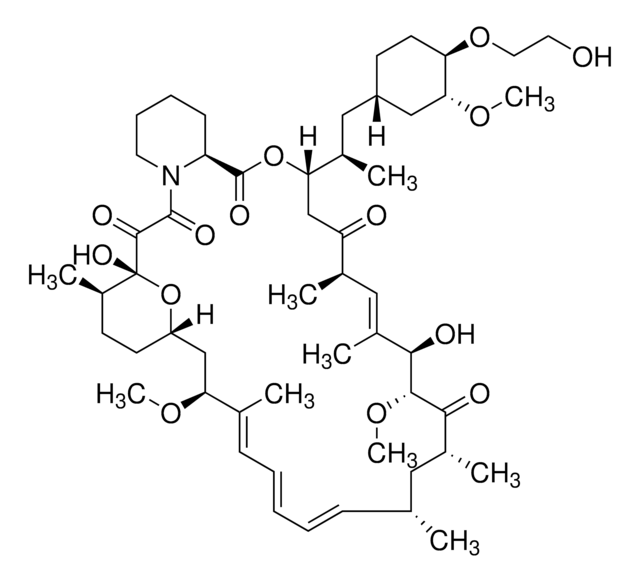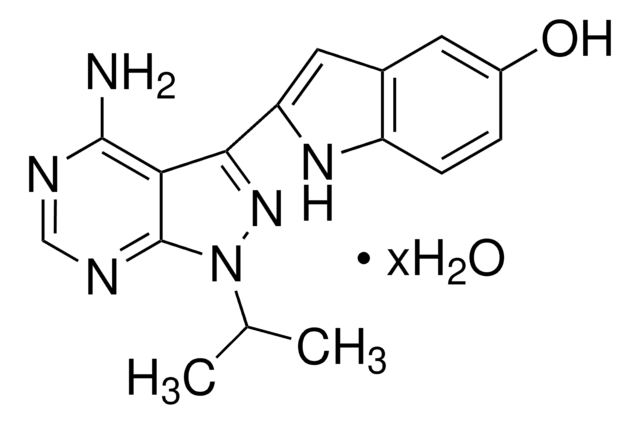PZ0020
Temsirolimus
≥98% (HPLC)
Synonym(s):
42-[3-Hydroxy-2-(hydroxymethyl)-2-methylpropanoate]-rapamycin, CCI-779
About This Item
Recommended Products
Quality Level
Assay
≥98% (HPLC)
form
powder
color
white to off-white
solubility
DMSO: ≥20 mg/mL
storage temp.
room temp
SMILES string
CO[C@@H]1CC(CC[C@H]1OC(=O)C(C)(CO)CO)C[C@@H](C)[C@@H]2CC(=O)[C@H](C)\C=C(C)\[C@@H](O)[C@@H](OC)C(=O)[C@H](C)C[C@H](C)\C=C\C=C\C=C(C)\[C@H](CC3CC[C@@H](C)[C@@](O)(O3)C(=O)C(=O)N4CCCCC4C(=O)O2)OC
InChI
1S/C56H87NO16/c1-33-17-13-12-14-18-34(2)45(68-9)29-41-22-20-39(7)56(67,73-41)51(63)52(64)57-24-16-15-19-42(57)53(65)71-46(30-43(60)35(3)26-38(6)49(62)50(70-11)48(61)37(5)25-33)36(4)27-40-21-23-44(47(28-40)69-10)72-54(66)55(8,31-58)32-59/h12-14,17-18,26,33,35-37,39-42,44-47,49-50,58-59,62,67H,15-16,19-25,27-32H2,1-11H3/b14-12+,17-13+,34-18+,38-26+/t33-,35-,36-,37-,39-,40+,41+,42+,44-,45+,46+,47-,49-,50+,56-/m1/s1
InChI key
CBPNZQVSJQDFBE-FUXHJELOSA-N
Gene Information
human ... FKBP1A(2280)
General description
Application
- in combination with radiation to study its effect on von Hippel Lindau (VHL) tumour suppressor gene-deficient renal carcinoma cell lines
- to induce autophagy
- as a mammalian target of rapamycin complex 1 (mTORC1) inhibitor to study the effect of cellular Akt-kinase on human papillomaviruses 16 (HPV16) late gene expression
Biochem/physiol Actions
Features and Benefits
Storage Class Code
11 - Combustible Solids
WGK
WGK 3
Flash Point(F)
Not applicable
Flash Point(C)
Not applicable
Certificates of Analysis (COA)
Search for Certificates of Analysis (COA) by entering the products Lot/Batch Number. Lot and Batch Numbers can be found on a product’s label following the words ‘Lot’ or ‘Batch’.
Already Own This Product?
Find documentation for the products that you have recently purchased in the Document Library.
Customers Also Viewed
Articles
We present an article about how proliferating cells require the biosynthesis of structural components for biomass production and for genomic replication.
Protocols
We offer many products related to PKB/Akt for your research needs.
Our team of scientists has experience in all areas of research including Life Science, Material Science, Chemical Synthesis, Chromatography, Analytical and many others.
Contact Technical Service







